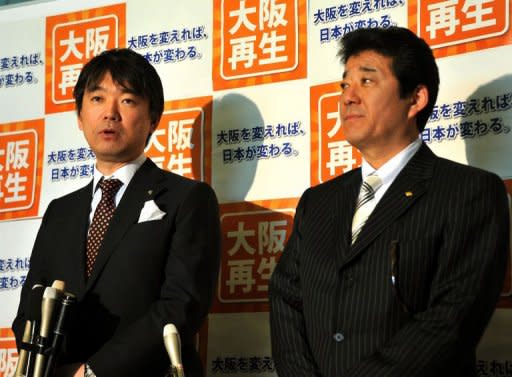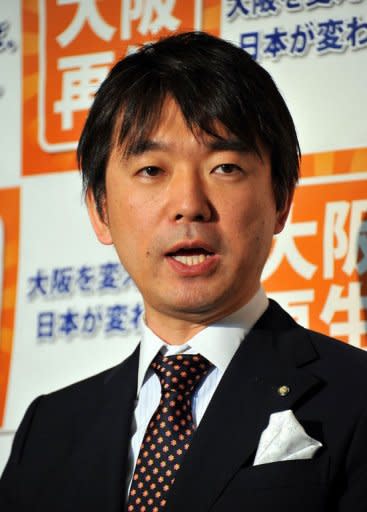Toru Hashimoto: Japan's would-be dictator
He admires cockroaches, once allegedly offered on air to impregnate a TV personality and openly admits to a lust for power. Oh, and the mayor of Osaka thinks Japan needs a dictatorship. Welcome to the world view of one of the country's most popular politicians, Toru Hashimoto, a 42-year-old with naked ambitions who is shaking Japan's political foundations to their core. A few years ago he was a corporate lawyer advising companies at the grubby end of personal finance -- a sector filled with businesses offering loans at punishingly high interest rates, some of which are rumoured to have connections to Japan's organised crime networks. Now Hashimoto, an almost nightly fixture on news broadcasts, is being courted by Tokyo's politicians as he looks to take his local party onto the national stage. With 2,000 followers signed up to a school he established to teach would-be parliamentarians, Hashimoto has a ready-made army aiming to take the political highground from squabbling lawmakers who have produced little more than a string of short-term, powerless premiers. "What Japanese politics needs now is dictatorship -- the power enough to be called 'dictatorship'," Hashimoto said last year while adding that power needs to be checked by local assemblies, voters and the mass media. "The source of power is the will of the people... Japan's biggest misfortune is that people cannot elect their prime minister directly," he said, referring to the system that sees lawmakers vote on who gets the top job. This authoritarian streak has been termed "Hashism" by academics and opponents. But opinion polls have shown the one-time rugby playing former lawyer -- and father of seven -- has his finger firmly on the nation's political pulse. One survey found 55 percent of voters want his Osaka Isshin no Kai (Osaka Renewal Party) to win "an influential number of seats" in the next general elections, while another saw him top a list of politicians "most suitable" to lead Japan, well ahead of Prime Minister Yoshihiko Noda. Hashimoto was brought up by a single mother -- his estranged father reportedly killed himself over debts to fellow small-time gangsters -- and he argues vehemently against handouts, saying they undermine society. "'No' to cutting off weak people. 'No' to widening disparity. 'No' to competition -- these sweet words are really dangerous," Hashimoto has said. "We will stop this evil trend." Formerly a man who had no qualms about nuclear power, he has voiced protest in recent months and now opposes plans by the ruling Democratic Party of Japan to allow the re-starting of reactors shuttered over safety concerns following the Fukushima disaster. Daiki Kawasaki, an Osaka city assemblyman and high-school contemporary, said Hashimoto was never seen as an intellectual powerhouse. "He wasn't earnest at rugby training sessions either but always put in a good performance when it came to real games," Kawasaki said. "He stood out as a hungry, unique boy among many A-students." That hunger translated itself into the singlemindedness of a politician determined to understand what makes voters tick. "He has no hobbies. His entire energy is directed to his job," Kawasaki told AFP. Hashimoto first came to public attention as one of the hundreds of vaguely colourful guests who populate a never-ending stream of TV comment shows. His quick, vicious wit and punchy put-downs won him his fair share of enemies -- he raised eyebrows when he reportedly told TV moderator Sawako Agawa: "I could knock you up right away." But they also garnered him a fanbase that propelled him to a 2008 landslide victory as governor of Osaka prefecture. It was the perfect platform from which to argue his "one Osaka" plan aimed at streamlining local government and cutting the overlap between city and prefecture. In October 2011, he resigned as governor to fight successfully for the job of Osaka mayor, with his hand-picked successor triumphing as governor. Over the past few years he has mesmerised Japan, lambasting major news organisations for being "stupid", bashing central government for its "rip-off" policies and flaying academics for "desk theories" that contrast with his street-level grittiness. "Cockroaches are great," he told a town meeting in 2010. "When you approach them, they dash off even though they have no eyes on their back. They have a great sense of crisis and we have to share the same sense of crisis." He has taken on Japan's heavily-protected farmers who detest his support for the Trans Pacific Partnership, a mooted huge free trade area. Hashimoto is also happy to confront liberal teaching unions, demanding that anyone who takes public money must stand to sing the national anthem -- a touchy subject in a nation where memories of expansionist imperialism refuse to fade. "He tickles where people are pleased to be tickled, attacks those who people want to be attacked," said economist Noriko Hama of the popular politician. But Hama echoes a criticism shared by many of Hashimoto's opponents: it's all form and no content. "I don't see where his real passion is," she said. Ichiro Ishii, a lawyer who was with Hashimoto during his legal training, also saw no particular dogma in his friend. "He isn't a man who has a certain ideology and makes decisions by deducing from it," Ishii said. "But he represents the feelings of people in their forties who have this sense that we are the generation that has to take care of a Japan built by baby boomers whose economic bubble has burst.


